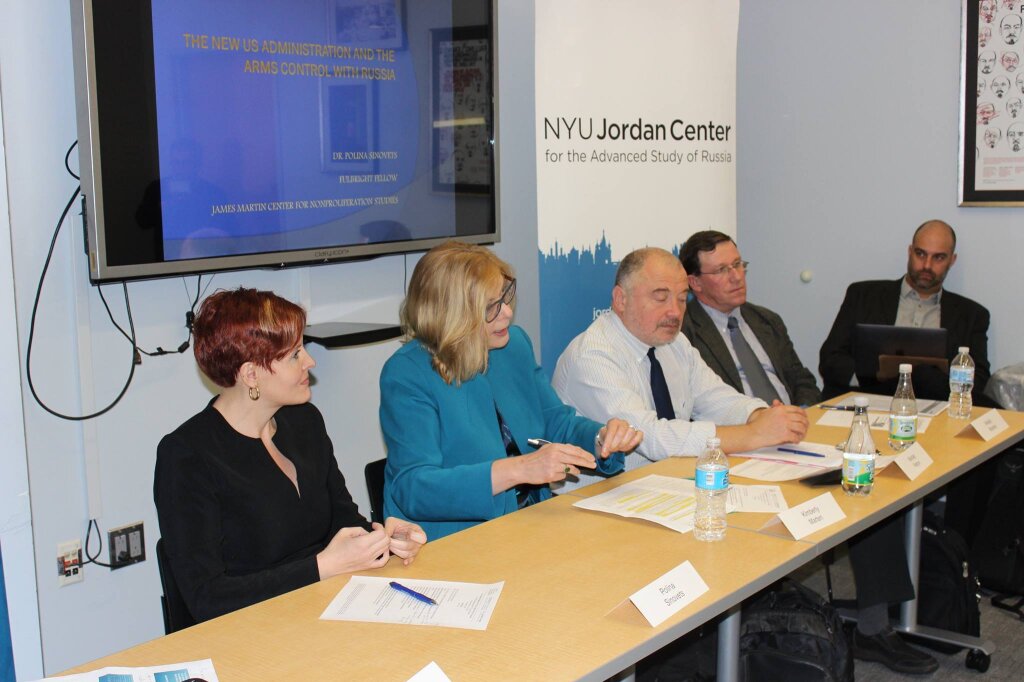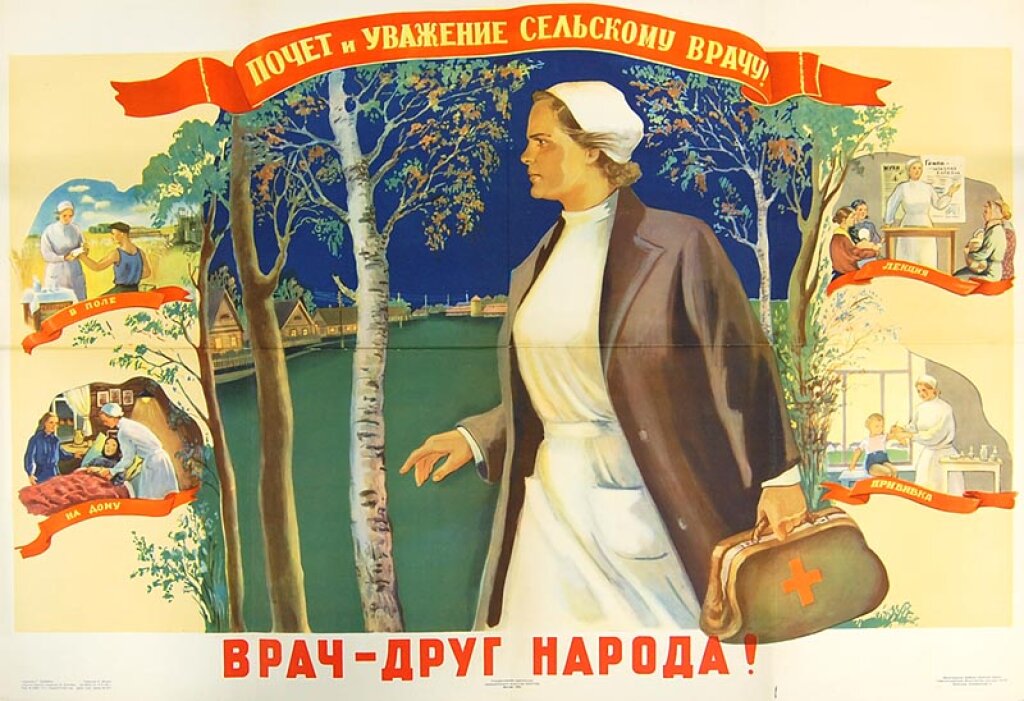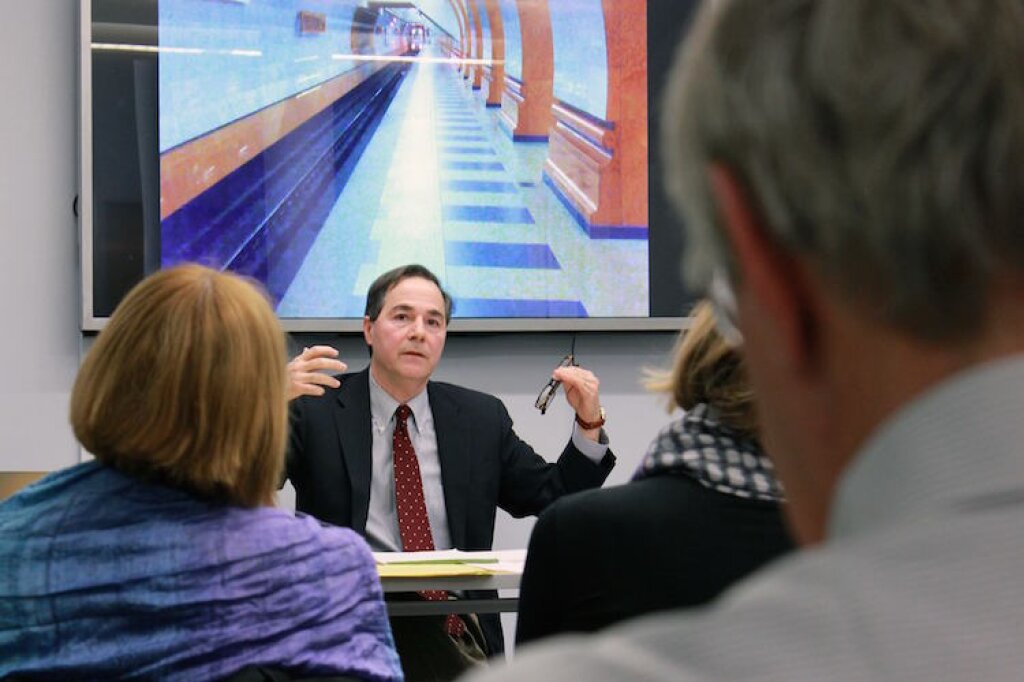Read the full volume of policy memos here!
On Wednesday November 8th, the NYU Jordan Center and PONARS Eurasia hosted a joint conference entitled, “Russia’s Relations with the West one Year after the US Presidential Elections.” Taking place on the one-year anniversary of Donald Trump’s election as U.S. president, the panel brought together scholars from a range of countries to consider the current state of U.S.-Russian/Eurasian relations and prospects for the future.
Joshua A. Tucker, Director of the Jordan Center, introduced the conference with a set of questions; 1) Have U.S.-Russian relations changed one year into Trump’s presidency? 2) How are relations between the two nations expected to develop in the future? 3) To what extent will domestic politics (of both countries) impact this relationship? 4) What was Russia’s role in the 2016 U.S. presidential elections?
Scholars in the first panel examined the various roots of the current state of U.S.-Russia relations and the risks that may lie ahead. The speakers included Arkady Moshes of the Finnish Institute of International Affairs, Vladimir Popov of the Dialogue of Civilizations Research Institute, Kimberly Marten of Barnard College and Columbia University, Polina Sinovets of Odessa Mechnikov National University, and Nikolay Petrov of the Higher School of Economics.
Moshes discussed the aftermath of the initial euphoria experienced by Russia following Trump’s election. The Russian government expected that U.S. sanctions would be lifted by Trump but to no avail. On the contrary, the West still perceives Russia as a challenge and a country whose “internal crisis” must be overcome. Thus, as Putin’s domestic policies remain unfavorable for the West, the relationship between the U.S. and Russia can be characterized as “non-cooperational.” Popov’s paper considered why the U.S. is so tough on Russia. Today, the rhetoric between the two regions is particularly harsh, largely due to tensions created by Russia’s annexation of Crimea. This state of relations can be traced back to the Soviet years, when the “balance of forces” between the two regions was crucial for international relations. Until 1975, Soviet GDP was growing, but it was nevertheless clear that the Soviet economic system was not a viable alternative to capitalism. Meanwhile, the U.S. actively fought Soviet ideology during the Vietnam War. Today, Russia’s aggressive advances in Crimea, Ukraine and Syria have exacerbated the tension in its relations with the U.S.
Marten discussed the inconsistencies in Russian policy toward the U.S. Following Trump’s election, Putin succumbed to his personal biases about the U.S. and Trump’s power, rather than considering concrete facts. Why didn’t Putin advisors better inform him? One possible answer, according to Marten, is that Putin’s advisors may be afraid to tell him the truth in fear of losing their privileged status and thus act according to their own agendas.
Sinovets continued with a discussion of the U.S. approach to arms control with Russia. The INF Treaty of 1987 was breached by Russia (although they deny it) and the New Start Treaty of 2010, while signed by both the U.S. and Russia, still left Russia’s side somewhat unclear in the agreement. Thus, the stance of the U.S. nuclear policy has shifted to accommodate the potential Russian challenge, according to Sinovets. Overall, in regards to international arms treaties, the U.S. has embraced a tougher stance toward Russia and apprehends the increased challenges to U.S. national security.
Finally, Petrov considered the fact that the domestic and international spheres of Russia’s politics are interrelated and impact each other negatively. On the international stage, sanctions make leverage with the West much harder for Russia. Both domestically and internationally, Russia uses political repression to fulfill its agenda. Moreover, public opinion has reinforced the skewed logic of Russia’ foreign policy, which is largely seen by Russians as being very successful and only 10% think war with Eastern Ukraine is a problem.
The second panel brought together the works of Volodymyr Dubovyk of Mechnikov National University, Ekaterina Stepanova of the Institute of World Economy & International Relations, and Pavel Baev of the Peace Research Institute Oslo. Dubovyk opened the panel by considering the impact of Trump’s election on U.S. relations with both Russia and Ukraine. The election created a “Ukraine collusion story”; while Clinton explicitly denounced Russian intervention in Ukraine, Trump bashed Ukraine for supporting Clinton. However, Trump is actually quite limited in his power in regards to foreign policy. So this raises a number of important questions. Who is leading the US’s Ukraine policy-making? and, Will the U.S. provide Ukraine with weapons? Stepanova followed by discussing U.S.-Russia relations, particularly in regards to Russian policy in Syria. According to Stepanova, Russia’s attitude toward Syria is not impacted by the U.S. However, the U.S. did allow for the initiation of peace talks in Astana, which has produced the longest lasting ceasefire in Syria. Peace talks in Geneva, however, were not based on a lasting ceasefire, did not resolve regional issues, and overall lacked a solid strategy. Baev concluded the panel by addressing the issue of counterterrorism as a potential point of cooperation for the U.S. and Russia. Money, propaganda and the uncovering of networks have been central components of counterterrorism efforts. Baev characterized the disagreements between the U.S. and Russia in regards to counterterrorism as “deep and fundamental” and the discussions as “artificial,” so it remains to be seen what kind of productive results can be achieved from this alliance.
The third panel consisted of Mikhail Alexseev of San Diego University, Timothy Frye of Columbia University, and Adam Stulberg of Georgia Tech. Alexseev began by considering Congress’ relationship with Trump in regards to the 2017 sanctions imposed against Russia. Congress has come together in “bipartisan opposition” to the President on foreign policy, particularly in viewing “Russia as [a] geo-political threat.” Thus, as Congress mobilizes, the perceived threats from Russia may ultimately overwhelm other efforts at counterterrorism alliances, as Alexseev stated.
Frye discussed surveys he conducted in order to gauge public opinion among Russians in response to the U.S. sanctions of 2014. When surveying reactions to sanctions in general, Frye discovered that sanctions do reduce support among Russians for the sanctioner but there was no direct evidence of feelings toward the Russian government. However, when the reason for imposition of the sanction (i.e. annexation of Crimea) was included in the question, the majority of respondents expressed great support for the Russian government.
Finally, Stulberg discussed the limitations of U.S. sanctions on Russia’s energy sector. The limits of US/EU sanctions on Russia include unclear objectives, the continuation of “business as usual” in Russia and collateral damage. Thus, the central issue, according to Stulberg, is implementing “sustainable” sanctions and making assurances about their impact.
The fourth panel combined the papers of Ivan Kurilla of European University at St. Petersburg, Marlene Laruelle of George Washington University, Alexandra Yatsyk of Kazan Federal University and Serghei Golunov of Kyushu University. Kurilla reflected on the history of U.S.-Russia relations, noting that much of the 20th century (in the midst of such events as Watergate and the Civil Rights Movement) was focused on placing in Russia in a negative light in order to lift up the U.S. position. This phenomenon has continued after Trump’s election, as blaming Russia has been used as a primary tool for coping with Trump, rather than questioning the role of American identity in these developments. Laruelle discussed the role of Christianity in building common ground between the alt-right in the U.S. and Russia. Rather than any obvious institutionalized interactions, the similarities manifest themselves in ideological connections. This relationship, as Laruelle noted, can be characterized as a kind of “confluence”, rather than “influence.”
Yatsyk’s paper analyzed patriotic themes in Russian pop culture and how they function as a form of “anti-American propaganda.” Many pop music videos in contemporary Russian culture highlight Russian national identity and attempt to naturally integrate images of patriotic singers with militants into one space. As such idealistic images are pasted together within the narrative of a single music video, the Russian state similarly attempts to “construct [such] fantasies in real life.”
Golunov concluded the panel by addressing the rise of conspiracy theories in both the U.S. and Russia as a form of anti-propaganda. Russia’s use of anti-American rhetoric has served as a central method by which to legitimize Putin. Following Trump’s election, the discussion of Russia’s hacking the election has become such a prominent topic as a central point of blame for Trump’s victory, that its narrativization has taken on the model of a conspiracy theory. In the aftermath of the 2016 election, U.S.-Russia relations have become increasingly contentious, with both sides taking great strides to discount the other.



